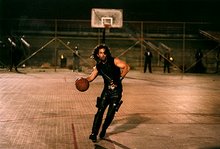
The rumor mill is in full effect. According to Sporting News (via Ballhype, which really means via AZ Sports Hub and some other dudes, doesn't it?), an anonymous source claims there's a 50-50 chance of seeing an Odom-for-Marion blockbuster. Couple that with his fairly-legitimate-sounding trade demand and I think it's fair game to start getting mildly excited.
I know what you're thinking. We all remember what happened last time I got excited when a player the Lakers coveted made a "trade demand." [Tangent: have we ever had a summer filled with so many false threats and half-assed demands?] And god knows how long I've been advocating the AK-for-Odom hotness, which Kirilenko's vocal displeasure seems to have advanced none at all. So what makes this idle speculation any different than the past examples? Nothing, really, but I feel compelled to weigh in nonetheless, mostly because we don't got much else to talk about just yet.
First off, we've already shown that numbers don't lie and Odom isn't as good as I might want to believe he is. Seriously, though, in the PER-battle, Marion wins handily, hitting a career-high of 23.6 with Amare not around and cracking 20 in four other years. Odom peaked at 18.9 his sophomore year and has been under 18 in all three of his years on this end of Staples. (Hypocrite, you say? Agreed) Couple that with the fact that Marion's probably the best (or at least the most versatile) defensive player in the game, and it's hard not to see Marion as an upgrade. The real clincher for me, however, is that Marion hasn't dipped below 79 games a season since his rookie year. Odom, on the other hand, has missed an average of almost 20 games per season. That health upgrade alone could be worth an extra four or five wins over the course of a season. Honestly, the fact that Odom's behind on his recovery from shoulder surgery (via FB&G) and other GMs are even still looking at him is amazing to me.

There are a few downsides worth considering. Losing Odom's passing is probably the biggest problem I see. Not having Odom around would put a lot of pressure on Fisher, Farmar, and Luke to distribute. It's also worth considering that familiarity with the triangle is often cited as one of the most important factors for excelling in it. Odom in his fourth year in the system probably has a considerable edge over Marion in his first. The extra $3 million owed to Marion is also not insignificant, but a contract like Cook's would have to be included to balance the books, making the impact on the team's cap negligible (as far as I understand). At this point, there aren't a whole lot of non-lateral type of moves left out there, and this might be the best chance for the Lakers to make an upgrade. However, the deal would still have its drawbacks. Losing Cook would probably make the guys that made this video extremely happy, but the truth is the lost depth at PF could hurt down the road.
Would this move make the Lakers contenders? Probably not. Do I think that's a fair standard by which to judge all transactions? Definitely not. The bottom line for me is that trading Odom for Marion shows a willingness mix things up. As currently configured, the Lakers would be hard-pressed to make much noise come playoff time. Shoring up one of their major weaknesses (defense) and appeasing Kobe by acquiring a close friend of his (who's already saying things like the Lakes have "a great organization, great ownership") make this possible trade worth the risk.


























